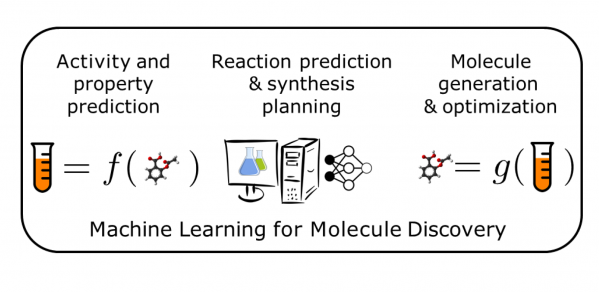
Discovering new molecules with desired functions or activities can; provide new medicines, secure the world’s food supply via agrochemicals, or enable sustainable energy conversion and storage to counter or mitigate climate change.
Molecule discovery is one of the areas where machine learning methods have more potential for real-world impact. This new research program will accelerate our efforts in this direction, playing a key role in connecting machine learning researchers, molecular science experts and key industry players.
José Miguel Hernández Lobato, Professor of Machine Learning
However, the discovery of new molecules or molecular materials that are optimised for a particular purpose can often take up to a decade and is highly cost-intensive.
Machine-learning (ML) methods can accelerate molecular discovery. In light of the COVID-19 crisis and future pandemics this acceleration is particularly meaningful.
To reach the goal of speeding up the discovery of new functional molecules, the European Laboratory for Learning and Intelligent Systems (ELLIS) has approved a new research program called: ‘Machine Learning for Molecule Discovery’, which aims to establish a dialogue between domain experts in molecular sciencies and ML researchers to ensure that ML positively impacts real world scenarios in the field. They will push the scientific boundaries of their respective areas by fostering exchange and research collaborations with other outstanding researchers in Europe.
The program’s objectives are to advance computational molecular science by improving molecular representations, molecular modelling, property prediction, generative modelling for molecules and molecular optimisation, and chemical synthesis through ML methods.
ELLIS is a pan-European AI network of excellence which focuses on fundamental science, technical innovation and societal impact. The program intends to connect researchers from:
- ELLIS units (such as Cambridge, Linz, and Berlin),
- Academia
- Pharmaceutical and Technology companies.
The direct exchange among experts and open discussions about research results are a crucial aspect for advancing science.

José Miguel Hernández Lobato, Professor of Machine Learning at the University of Cambridge and ELLIS Scholar is one of the co-directors of the new program.
He explains; "Research within ELLIS is organised into ELLIS Programs. These Programs focus on high-impact problem areas that have the potential to move the needle in modern AI. Each Program has a budget for 2-3 workshops each year to enable meetings of ELLIS Fellows plus guests for intensive scientific exchange”.
"Molecule discovery is one of the areas where machine learning methods have more potential for real-world impact. This new research program will accelerate our efforts in this direction, playing a key role in connecting machine learning researchers, molecular science experts and key industry players."
Günter Klambauer, ELLIS Scholar, one of the coordinators of this program and Associate Professor for Artificial Intelligence in Life Sciences at Johannes Kepler University Linz says; "Molecules are in the centre of almost all natural sciences, from chemistry and material science over physics to molecular biology. Similarly, almost all sub-fields of machine learning yielded applications for molecules: For example: Geometric Deep Learning finds molecules a rich field for equi- and invariances, Deep Learning architectures predict molecular properties or generate molecules, and deep reinforcement learning helps with planning chemical synthesis routes. By advancing machine learning, we will speed up molecule discovery, and ELLIS has the key role in this to connect machine learning researchers with molecular sciences and industry. First steps in this direction have been made through the ELLIS ML4Molecules workshops in 2021 and 2022 with over 1,300 registered participants.”
The program proposal was also coordinated by Nadine Schneider (Novartis).

